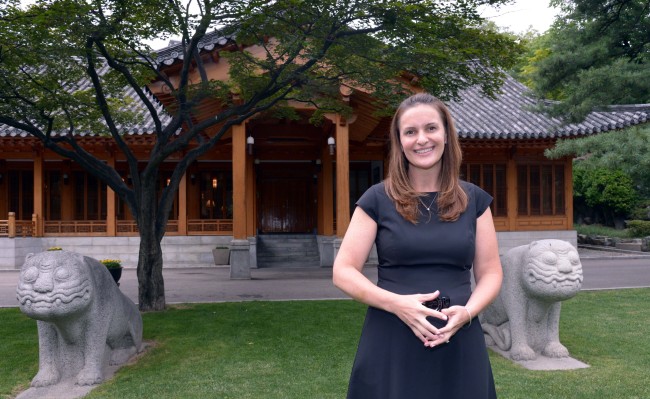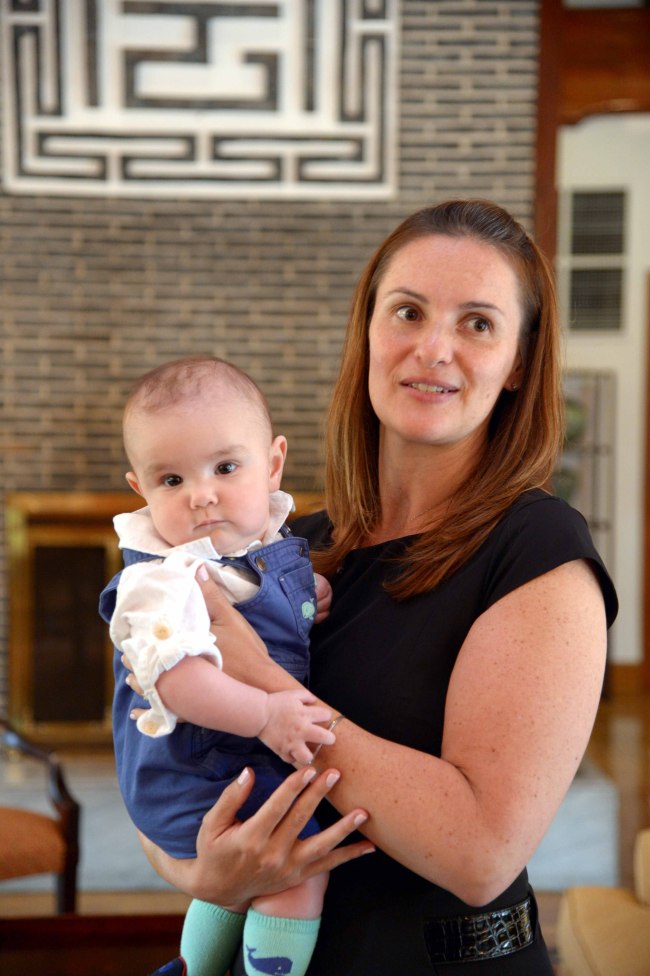Robyn Lippert, wife of U.S. Ambassador Mark Lippert, is well-known here as “Sejun’s mom,” one of the great examples of her having earned the hearts of South Koreans enthralled by the dedication the couple has shown to fit in.
Since arriving in Seoul pregnant last year, she has been playing a crucial part in her husband’s people-to-people diplomacy, setting her image as humble and open-minded — a far cry from what many have seen through local magazines depicting the elegant lives of foreign envoys’ spouses here.
 |
| Robyn Lippert, wife of U.S. ambassador Mark Lippert, poses at the Habib House downtown in Seoul (Chung Hee-cho/The Korea Herald) |
From the photos of her holding her first child, James William Sejun Lippert, just a few hours after she gave birth, to casually landing a kiss on her husband at a baseball stadium while having “chimaek“ (fried chicken and beer), she has shared her very personal moments with the people here.
She even took her carefree nature to the streets, as she casually converses with keen passersby while carrying the newborn for a walk.
But, not many know that the spouse of the U.S. top envoy is not just Sejun’s mom, but also a successful career woman striving to balance work and family. Lippert is senior vice president of external affairs at UnitedHealth Group, the largest U.S. health insurer.
Inside the Habib House — the residence of the U.S. ambassador in downtown Seoul — she spends her days with Sejun and a basset hound named Grigsby. But after her family falls asleep, she turns on the computer and begins her work.
“I am fortunate because I work in U.S. hours, so I work during the evening, which means I have my days to really explore Korea and take Sejun around museums and hiking,” she said as she sat down for an interview with The Korea Herald in the main hall of the Habib House.
The dining room is her temporary office where she makes frequent conference calls, careful not to wake the other two in the middle of the night. Lack of sleep is her concern, but is definitely one of the “trade-offs” that allows her bonding time with the baby.
Balancing work and family is, indeed, challenging, she said, like for many others around the world. But she believes that it can be done by setting priorities and sharing parental duties.
“There has to be that honest and hard discussion that you can’t do everything,” she said.
“Choosing which are the most important elements, and you know, for me that is family first and work second.”
In her effort to balance family and work, her husband is more than willing to help out, such as by supporting her trip to the U.S. once a month.
“I do think that there are increasingly more shared responsibilities, and in our house Mark has been fantastic in terms of changing diapers and getting up in the night to take care of Sejun if he is upset and walking Grigsby out.”
 |
| Robyn Lippert holds her six-month-old son Sejun. (Chung Hee-cho/The Korea Herald) |
A native of Boston, Lippert worked in U.S. Sen. Patrick Leahy’s office, where she first met her future husband. After eight years of dating, the two got married in 2008.
“I thought he was really funny, he has a great sense of humor and he is incredibly smart, and with both of us working in the Senate, we had so many common interests,” she said.
“Both were looking toward similar beliefs about making the world better and that is why we were in those jobs. We found someone who shares that interest and lives it every day … it was very important.”
Between dating and marriage, both their careers took dramatic turns.
Before being stationed in Seoul as the youngest U.S. ambassador to Korea, her husband served as deputy national security adviser and the National Security Council’s chief of staff.
Lippert also expanded her career both in the public and private sectors. Before joining UnitedHealth Group, she also worked at Fannie Mae in addition to working on various political campaigns including the Kerry-Edwards 2004 campaign.
It was Korea that made the couple spend more time together, as her husband was traveling a lot to Asia while in Washington. After three months in Seoul, the couple welcomed their first baby. They gave the boy a Korean middle name, Sejun, by taking reference from the saju — a traditional Korean way of selecting names based on the hours and the date a baby was born.
“Korea is very special for our family,” she said.
“We chose a Korean name because we want Sejun to always have a connection to this special country and always be aware of that.”
Though too young to remember all these cross-cultural experiences in Seoul, Lippert as a mom hopes her child can have an “international perspective” in the future. The six-month-old child is being partly raised by a local nanny who speaks to him in Korean. The mother is also planning to let him explore both Korean and American food as he grows up.
“Just having him learn about Korean culture, and having him learn Korean, it is just a part very important to us that he grows up with an international perspective and it is just the initial foundation for him.”
“It is always a part of our recognition of how special Korea is to us. And we really want him to embrace that and be part of his life as he grows up.”
Of course, life in Seoul has not always been easy, and even life-threatening.
In March, the ambassador was slashed by a knife-wielding man in downtown Seoul. He was taken to a nearby hospital where he received surgery for the cut stretching from his right cheek to his chin and another injury on his left arm. Despite the devastating incident, the Lipperts remained unperturbed, but rather comforted the well-wishers concerned for his safety.
“It was definitely a surreal experience,” she said, recalling the incident four months ago.
“The response and reaction from folks throughout South Korea was just amazing, and the support and the warmth we felt immediately after and still continuing is absolutely amazing … and it has just made us to love this country even more,” she said. The ambassador is recovering really well and has hardly any visible scars, she added.
Besides being a working mom, Lippert has shown her dedication to promote cultural exchanges between the two countries.
A collection of U.S. works of art, including Sen. Leahy’s photography, will be arriving in late July as part of the “Art in Embassies” program, she said. The works will be installed at the Habib House along with other Korean pieces permanently placed at the residence, to showcase both Korean and American art.
Calling the house, “one of the nicest residences in the world,” Lippert said she is very lucky to experience both cultures at one house. Named after former ambassador Philip Habib, the hanok (a traditional Korean house) was built in the 1970s, and has served as a symbol of the bilateral relationship between Seoul and Washington.
“It is a special combination of Korean architecture and style, but (is) actually made with U.S. wood,” she said. “A perfect blending of the two cultures.”
By Cho Chung-un (christory@heraldcorp.com)

